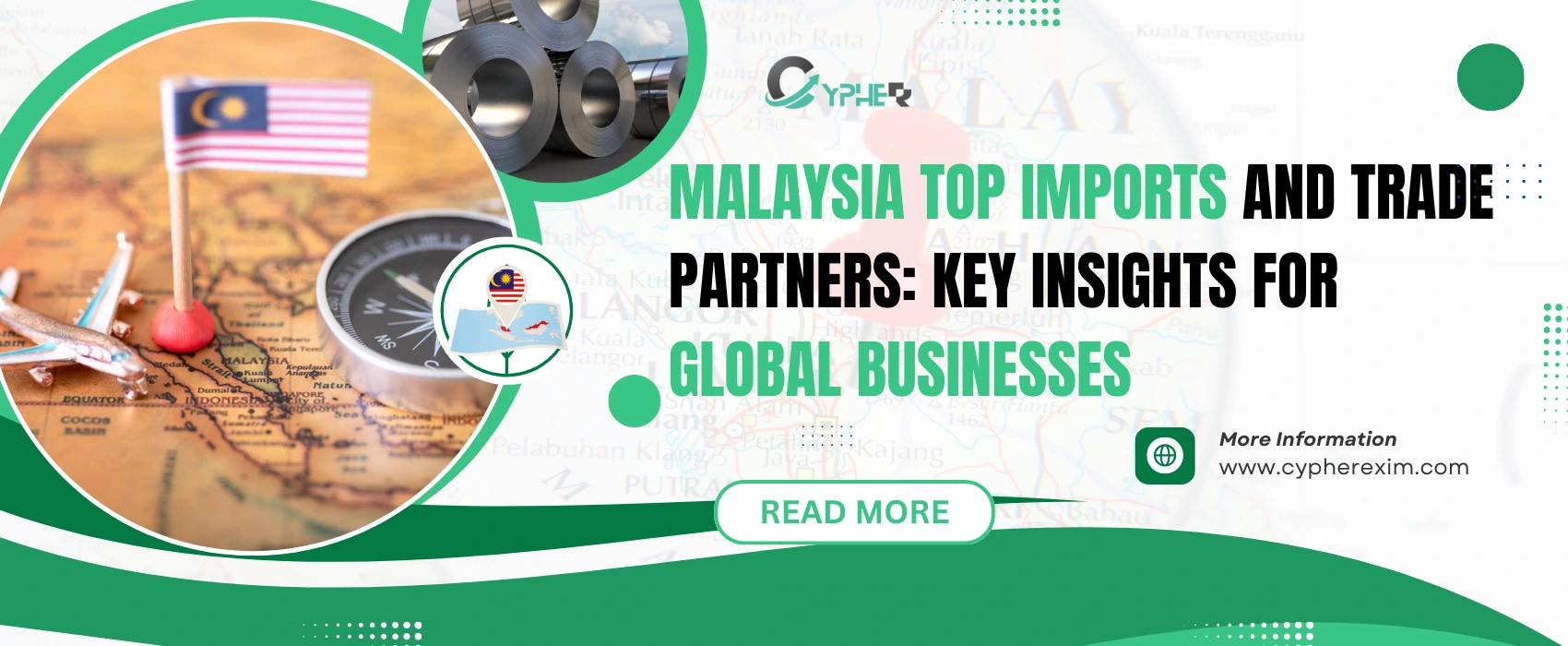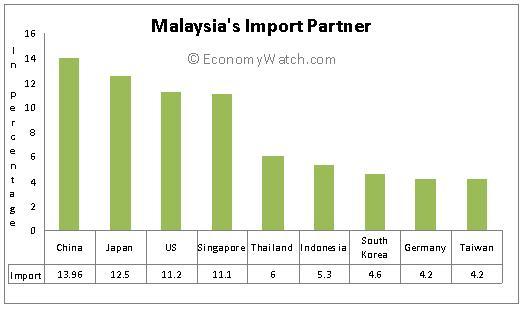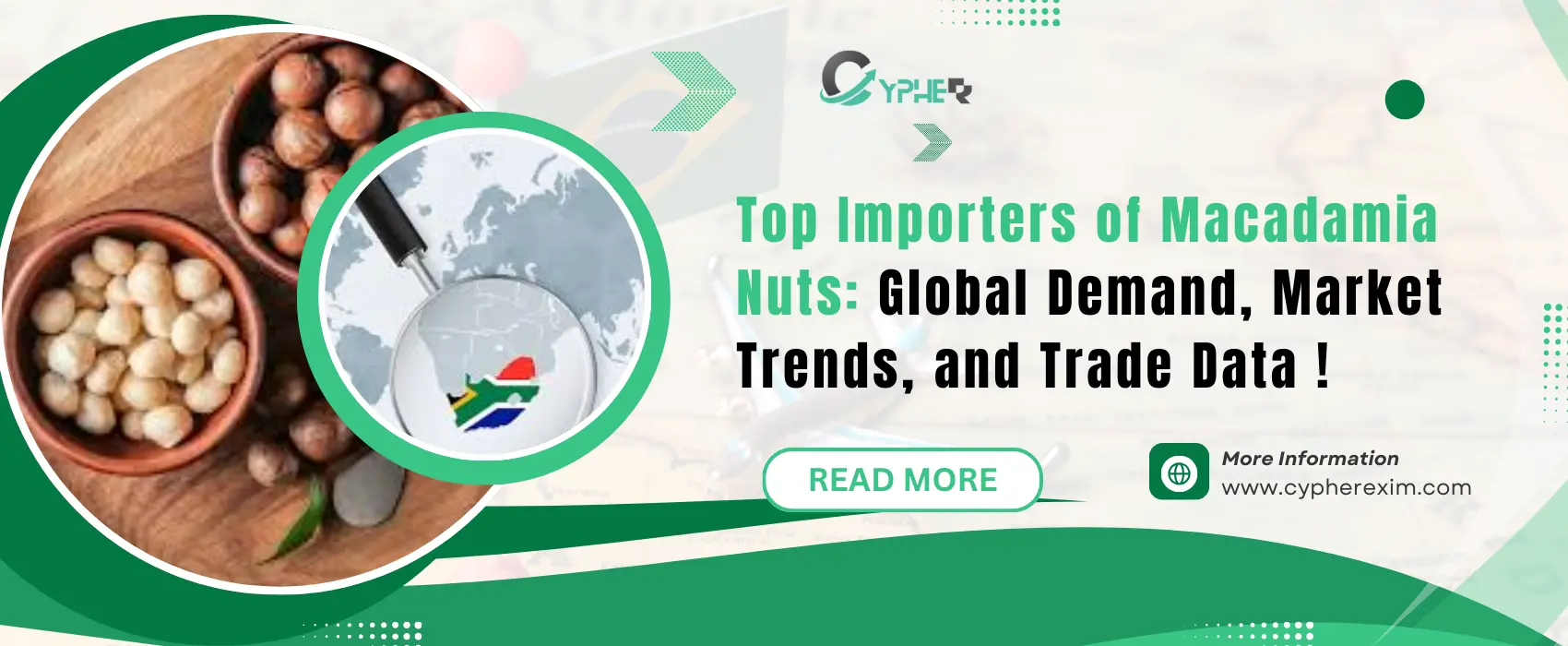Malaysia Top Imports and Trade Partners: Key Insights for Global Businesses

19 Aug 2025
One of the vibrant economies in Asia called Malaysia presents itself as an indispensable and respectable player to the international trade, as they rest on an advanced range of diversified processed goods and other products to sustain their industries. Malaysia import side has become an important software for the flow of goods into other divisions of the world due to the existence of strong partnerships in international trade and the rise in the global demand for raw materials and finished products. In this article, we will delve into the import products that Malaysia finds at the top, the trading partners that are the key, and the economic trends that the data is from, and all of that you will enjoy with data-backed insights from Cypher Exim, a global trade import-export data provider.
Malaysia Top Import Products
Malaysia's economy heavily relies on imports to satisfy the needs of its varied industries such as electronics, energy, manufacturing, and even healthcare. The following is the list of Malaysia's highest imported products.
Electronics and Electrical Machinery
Electronics and electrical machinery account for over 25% of Malaysia’s total imports, reflecting the country's reliance on high-tech components for its technology and manufacturing sectors. Crucial imports for Malaysia includes semiconductors, telecommunication devices, and consumer electronics which are essential for the automotive, telecommunications, and industrial automation industries, solidifying its apex fabrication position in the world.
Mineral Fuels and Petroleum Products
Fuels and petroleum are crucial for Malaysia’s energy industry, offering support for industrial activities, transport and power generation. The nation depends on crude oil, refined petroleum and natural gas as the basic elements to power its manufacturing and logistics industry. The imports help maintain economic activities, construction projects, and energy dependability which all require stable functions from many areas.
Machinery and Industrial Equipment
Machinery and industrial equipment are crucial imports for Malaysia’s manufacturing, construction, and automotive sectors. The country relies on advanced machinery, automation tools, and industrial equipment to enhance production efficiency and infrastructure development. Key imports include nuclear reactors, mechanical tools, and heavy industrial machines, supporting Malaysia’s growing economy and technological advancements in various industries.
Chemicals and Pharmaceutical Products
Chemicals and pharmaceutical products are vital imports for Malaysia’s healthcare, agriculture, and industrial sectors. The country imports medical drugs, industrial chemicals, and fertilizers to support its growing medical industry and agricultural productivity. These imports are essential for pharmaceutical manufacturing, research, and industrial applications, ensuring steady supply chains for healthcare services and production industries.
Vehicles and Automotive Parts
Vehicles and automotive parts are among Malaysia’s key imports, supporting its transportation, logistics, and manufacturing industries. The country imports passenger cars, trucks, heavy vehicles, and spare parts to meet domestic demand and enhance its automobile sector. These imports help drive economic growth, improve infrastructure, and support the expansion of Malaysia’s automotive industry.
Malaysia Top Import Partners
Malaysia trade relationships are driven by regional cooperation and strategic alliances, ensuring a steady flow of essential imports. China is Malaysia’s largest import partner, supplying electronics, machinery, and raw materials. Singapore plays a key role as a re-export hub, providing petroleum and consumer goods. The United States exports high-tech equipment, medical products, and semiconductors. Japan and Germany are also major trade partners, supplying automobiles, industrial machinery, and engineering products. These partnerships support Malaysia’s manufacturing, energy, and technology sectors, reinforcing its position as a global trade hub.
China – Leading Import Partner
China is Malaysia largest import partner, contributing over 20% of its total imports. The country supplies electronics, machinery, textiles, and raw materials, which are essential for Malaysia’s manufacturing, construction, and consumer industries. China strong trade ties with Malaysia are driven by cost-effective production, regional proximity, and trade agreements that facilitate seamless imports. As Malaysia continues to grow as a global trade hub, its reliance on Chinese imports remains critical for economic stability, industrial growth, and technological advancements.
Singapore – Strong Regional Trade Relationship
Singapore is a key trade partner for Malaysia, serving as a major hub for re-exporting goods due to its strategic location and strong trade infrastructure. It supplies electronics, medical products, and petrochemicals, which are essential for Malaysia’s technology, healthcare, and energy sectors. Singapore’s efficient logistics network and advanced supply chain capabilities facilitate seamless trade between the two nations. As both countries are part of ASEAN, their economic ties remain strong, driving regional trade growth and business expansion opportunities.
United States – Key Technology and Industrial Equipment Supplier
The United States is a key supplier of high-end machinery, semiconductors, and pharmaceuticals to Malaysia, supporting its technology, healthcare, and industrial sectors. Malaysia benefits from U.S.-ASEAN trade agreements, which facilitate smooth trade flows and lower tariffs. The U.S. supplies advanced equipment essential for manufacturing and innovation, strengthening Malaysia role as a global production hub. This trade relationship enhances technological growth, industrial expansion, and medical advancements, making the U.S. a vital partner in Malaysia economic development.
Japan – Supplying High-Tech Equipment
Japan is one of the biggest companies which are offering high-tech equipment to Malaysia by cars, gadgets, and factory devices first which are the highest priority of the country. When everything is working well, the trade relations in Japan and Malaysia is solid to a very great extent and it is a crucial step in upgrading Malaysia’s technological muscle. The import of highly developed machinery and automotive parts is the driver of the industrial sector that is the paramount reason for its growth in Malaysia, while green energy imports lead to electricity generation and environment-friendly programs. The buying and selling of items back and forth stay to grow thus assures to be the source of economic development and innovation that the two partners benefit from.
European Union – Strong in Machinery and Pharmaceuticals
The European Union is a key trade partner for Malaysia, with Germany, France, and the Netherlands being major suppliers. The EU exports automotive parts, medical devices, and chemicals, supporting Malaysia’s automotive, healthcare, and industrial sectors. With strong trade agreements and advanced technology, the EU helps drive innovation and economic growth in Malaysia.
The Role of Cypher Exim in Trade Data Analysis
Cypher Exim plays a crucial role in trade data analysis, offering businesses real-time import-export insights to enhance global trade strategies. As a world import-export data provider, it delivers HS Code-based trade statistics, market trends, and competitor analysis. Businesses use Cypher Exim’s trade database to track global supply chains, identify emerging markets, and optimize sourcing decisions. With customized reports, API integration, and accurate trade intelligence, Cypher Exim empowers companies to make data-driven trade decisions, improving their competitive advantage in the global marketplace.
Malaysia Import Data in the Last 10 Years: Yearly Malaysia Trade Data

| Year of Imports | Total import value ($) | Global import share (%) |
|---|---|---|
| 2014 | $208.82 billion | 1.1% |
| 2015 | $176.60 billion | 1.1% |
| 2016 | $168.78 billion | 1% |
| 2017 | $195.08 billion | 1.1% |
| 2018 | $217.66 billion | 1.1% |
| 2019 | $204.98 billion | 1.1% |
| 2020 | $189.55 billion | 1.1% |
| 2021 | $238.32 billion | 1.1% |
| 2022 | $295.09 billion | 1.2% |
| 2023 | $265.97 billion | 1.1% |
| 2024 (10 months) | $248.37 billion | 1.2% |
Conclusion
Much of Malaysia’s economic growth continues to be fueled by a strong and diverse import market, supported by robust trade relations with key regions across Asia, Europe, and the United States. The country’s ability to balance imports and exports while adapting to changing global demand makes it a vital player in international trade.For businesses seeking to expand, invest, or analyze trade trends, Cypher Exim’s trade intelligence solutions provide a powerful way to gain actionable insights. Our platform delivers comprehensive access to Import Data India, Export Data India, and detailed Import Export Data India, helping companies understand cross-border trade patterns, identify potential partners, and uncover new market opportunities. With Cypher Exim, businesses can make informed, data-driven decisions to strengthen their global presence — leveraging accurate, up-to-date trade intelligence to stay ahead in today’s competitive market.
Explore Malaysia import data with Cypher Exim– Stay ahead in global trade!






